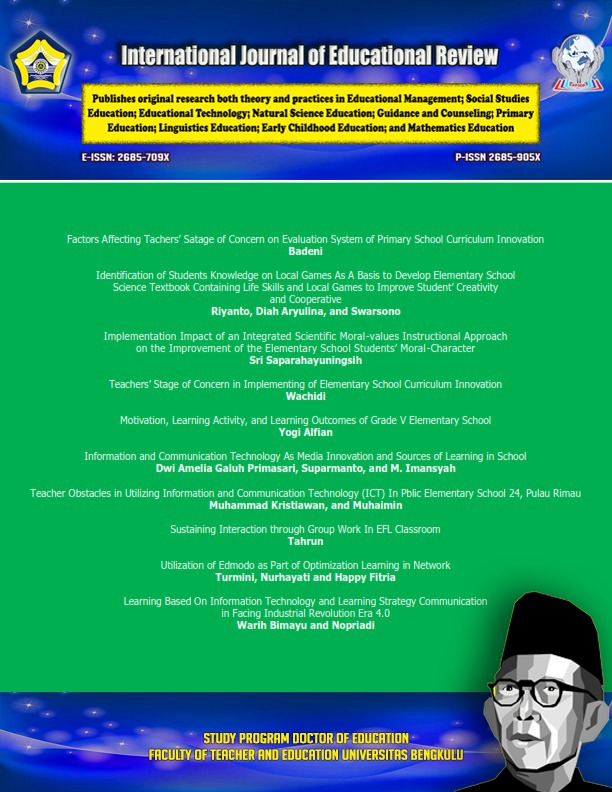Behavior of Participating Leadership in Developing Job Satisfaction of Islamic Religious Teachers in Private Vocational School in Jambi
DOI:
https://doi.org/10.33369/ijer.v3i2.15768Abstrak
This paper recognized and provided an overview of participatory leadership efforts in developing lecturer job satisfaction. A qualitative approach allows us to know the subject more directly and intimately. Data collection methods include observation, interviews, and documentation. The Miles and Hubermen model was used to analyze the data used in this analysis. Based on the report, the following conclusions can be drawn 1) make decisions with the help of subordinates; 2) The leadership of PTKIS empowers lecturers by holding training activities, seminars, workshops, making resource persons in campus activities, assigning tasks and responsibilities based on their expertise and educational background, recommending lecturers to continue their doctoral degrees and participate in the 5000 doctoral scholarship program, and 3) PTKIS leaders build open lines of communication with their subordinates.
Referensi
Ade, F. (2018). Kepemimpinan Partisipatif Di SMA Labschool Kebayoran Jakarta [Participatory Leadership at SMA Labschool Kebayoran Jakarta], Tasharruf: Journal Economic and Business of Islam, Vol. 2 No. 1. 107, http://journal.iain-manado.ac.id/index.php/TJEBI/article/download/660/545
Afandi, P. (2016). Concept & Indicator Human Resources Management for Management Researth. Jakarta: CV Budi Utama.
Colquitt, A, J., LePine, J. A., & Wesson, M. J. (2011). Organizational behavior. New York: McGraw Hill.
Domai, T. (2012). Paradigma Baru Nuansa Kepemimpinan [Sound Leadership "A New Paradigm of Leadership Nuances]. Malang: UB Press.
Fanani, A. Z. (2013). Kepemimpinan Pendidikan Presoektif Islam [Islamic Education Leadership]. Surabaya: IAIN SA Pres.
Hasibuan, M. S. P. (2013). Managemen Sumber Daya Manusia [Human Resource Management]. Jakarta: Bumi Aksara.
Mahmud, H. (2015). Administrasi Pendidikan Menuju Sekolah Efektif [Educational Administration Towards Effective Schools]. Sulawesi Selatan: Aksara Timur.
Moleong, L. J. (2011). Metodologi Penelitian Kualitatif [Qualitative Research Methodology]. Bandung: PT. Remaja Rosdakarya.
Nawawi, H., & Hadari, M. (2012). Kepemimpinan Yang Efektif [Effective Leadership]. Yogyakarta: Gajah Mada University Press.
Nemaei, B. (2012). The Impact of participative leadership on employee's motivation, job satisfaction and innovation, Dissertation, The British University in Dubai, https://bspace.buid.ac.ae/bitstream/1234/343/1/80080.pdf
Priansa, D. J. (2016). Perencanaan & Pengembangan SDM [HR Planning & Development]. Bandung: Alfabeta.
Raihani. (2010). Kepemimpinan Sekolah Transformatif [Transformative School Leadership]. Yogyakarta: LKiS.
Rowe, G. W., & Guerrero, L. (2010). Cases in Leadership Second Edition. Amerika: SAGE Publications.
Sagala, S. (2018). Pendekatan dan Model Kepemimpinan [Leadership Approaches and Models]. Jakarta: Kencana.
Schermerhorn, J. R., et all. (2010). Organizational Behavior. Hoboken New York: John Wiley & Sons, Inc.
Siagian, S. P. (2012). Manajemen Sumber Daya Manusia [Human Resource Management]. Jakarta: PT Bumi Aksara.
Sinani, F. (2016). The Effects of Participative Leadership Practices on Job Satisfaction for Highly Skilled Virtual Teams, Dissertation, Walden University https://scholarworks.waldenu.edu/cgi/viewcontent.cgi?article=3485&context=dissertations
Sucahyowati, H. (2017). Manajemen Sebuah Pengantar [Management an Introduction]. Malang: Wilis. (2015).
Utaminingsih, A. (2014). Perilaku Organisasi Kajian Teoritik & Empirik Terhadap Budaya Organisasi, Gaya Kepimpinan, Kepercayaan dan komitmen [Organizational Behavior of Theoretical & Empirical Studies on Organizational Culture, Leadership Style, Trust and commitment]. Malang: Universitas Brawijaya Press.
Yukl, G. (2017). Leadership in Organizations. Jakarta: PT Indeks.
Unduhan
Diterbitkan
Cara Mengutip
Terbitan
Bagian
Lisensi

This work is licensed under a Creative Commons Attribution-ShareAlike 4.0 International License.




